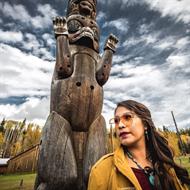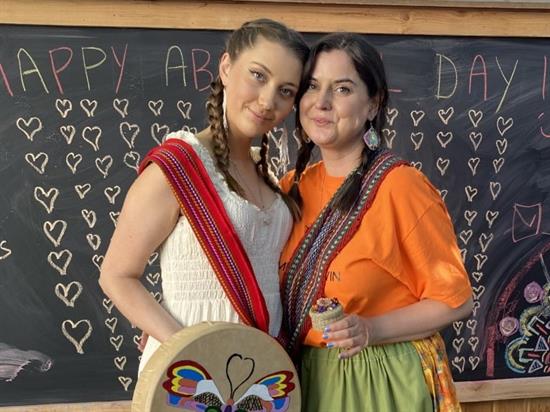It’s clear that racism leads to major disparities in education, income levels, and health outcomes. It also has a significant impact on mental health. This can lead to a vicious cycle for racialized and ethnic, cultural and religious minority groups, who are already disproportionately affected by social determinants of health.
“If someone is experiencing inappropriate behaviours or comments or is disadvantaged because of culture, creed or skin colour, the immediate effect is stress,” says Dr. Vijay Seethapathy, the chief medical officer at BC Mental Health and Substance Use Services. “Repeated and persistent stressors or trauma, whether racially motivated or not, can have a long-lasting impact on a client’s physiological and mental health status.”
 “Stress related to racism and discrimination is just the start of a cascade of changes that impact a person’s functioning, resilience, confidence and coping skills,” says Dr. Seethapathy.
“Stress related to racism and discrimination is just the start of a cascade of changes that impact a person’s functioning, resilience, confidence and coping skills,” says Dr. Seethapathy.
Stress isn’t just uncomfortable. It leads to biochemical changes in the brain that interfere with our body’s natural rhythm, causing physical symptoms such as fast or shallow breathing, rapid heart rate, muscle tension and trouble sleeping.
These physical symptoms worsen anxiety, depression, and substance use, and thoughts of self-harm or suicide.
“Stress related to racism and discrimination is just the start of a cascade of changes that impact a person’s functioning, resilience, confidence and coping skills,” says Dr. Seethapathy.
“One of the often overlooked yet damaging effects of racism on mental health is people internalizing it."
Research also shows that racism can also fundamentally affect a person’s identity.
“One of the often overlooked yet damaging effects of racism on mental health is people internalizing it,” says Dr. Jane Sun, a psychologist at BC Mental Health and Substance Use Services. “They start to hate their own ethnicity and have negative thoughts about their own body or personal appearance. All of this chips away at self-worth and self-esteem and impacts well-being.”
Rasicm also creates barriers to health care and resources, leaving many people and their loved ones even more vulnerable to poorer health outcomes.
 “In rural northern communities especially, I’ve seen some people experience challenges with mental health,” says Jessica Starlund, who is from the Gitxsan and Nuu-chah-nulth First Nations and has a family member receiving care at the Forensic Psychiatric Hospital. “Before I became involved and learned more about mental health and substance use, I felt alone and saw the weight on family’s shoulders.”
“In rural northern communities especially, I’ve seen some people experience challenges with mental health,” says Jessica Starlund, who is from the Gitxsan and Nuu-chah-nulth First Nations and has a family member receiving care at the Forensic Psychiatric Hospital. “Before I became involved and learned more about mental health and substance use, I felt alone and saw the weight on family’s shoulders.”
Even when care is available, a lack of cultural understanding or prejudice within the health care system can affect diagnoses and treatments. One study showed that Black and Hispanic males are three to four times more likely than white males to be misdiagnosed with schizophrenia. The In Plain Sight report found that Indigenous people are often discharged from a hospital without proper support or medication, and feel unsafe when accessing care.
“It made me feel ashamed and made me want to hide my Indigeneity for the longest time. It takes away that pride, self-worth and sense of identity."
Belle Beach-Alcock, an Indigenous care coordinator at BC Mental Health and Substance Use Services who is of Métis, Cree and Sioux heritage, has felt these effects firsthand. Growing up in a small, predominantly white town in Saskatchewan, there were few spaces for her to express her Indigenous identity outside of the family home. While taught to be “Indian and proud” by her grandparents, she says the slurs and jokes planted a seed of self-doubt that slowly grew over time.
“It made me feel ashamed and made me want to hide my Indigeneity for the longest time. It takes away that pride, self-worth and sense of identity. And it also takes away your spirituality because you can’t connect with your true essence when you have to push down everything about yourself and try to fit yourself into a mould that society has put before you.”
A trauma-informed, culturally sensitive approach is key to treating clients who have experienced racism, says Dr. Seethapathy. When clinicians acknowledge what has happened, it creates a safe environment for clients to express their emotions and recognize their strength and resilience.
Beach-Alcock uses talking circles, art groups and medicine wheel teachings to honour the spiritual aspect of wellness and provide a safe place for her clients to grow and heal. When the Red Fish Healing Centre for Mental Health and Addiction opens in October 2021, she and her clients will also be able to use the Hummingbird Room, a dedicated space for traditional spiritual healing practices such as smudging.
 Beach-Alcock (right) and her daughter, while volunteering on National Indigenous Peoples Day at the Burnaby Centre for Mental Health and Addiction.
Beach-Alcock (right) and her daughter, while volunteering on National Indigenous Peoples Day at the Burnaby Centre for Mental Health and Addiction.
“It’s nice to see a shift happening on both sides, with so many who are open to learning, being curious and asking questions,” says Starlund. “That type of openness has helped my relative at the Forensic Psychiatric Hospital.”
